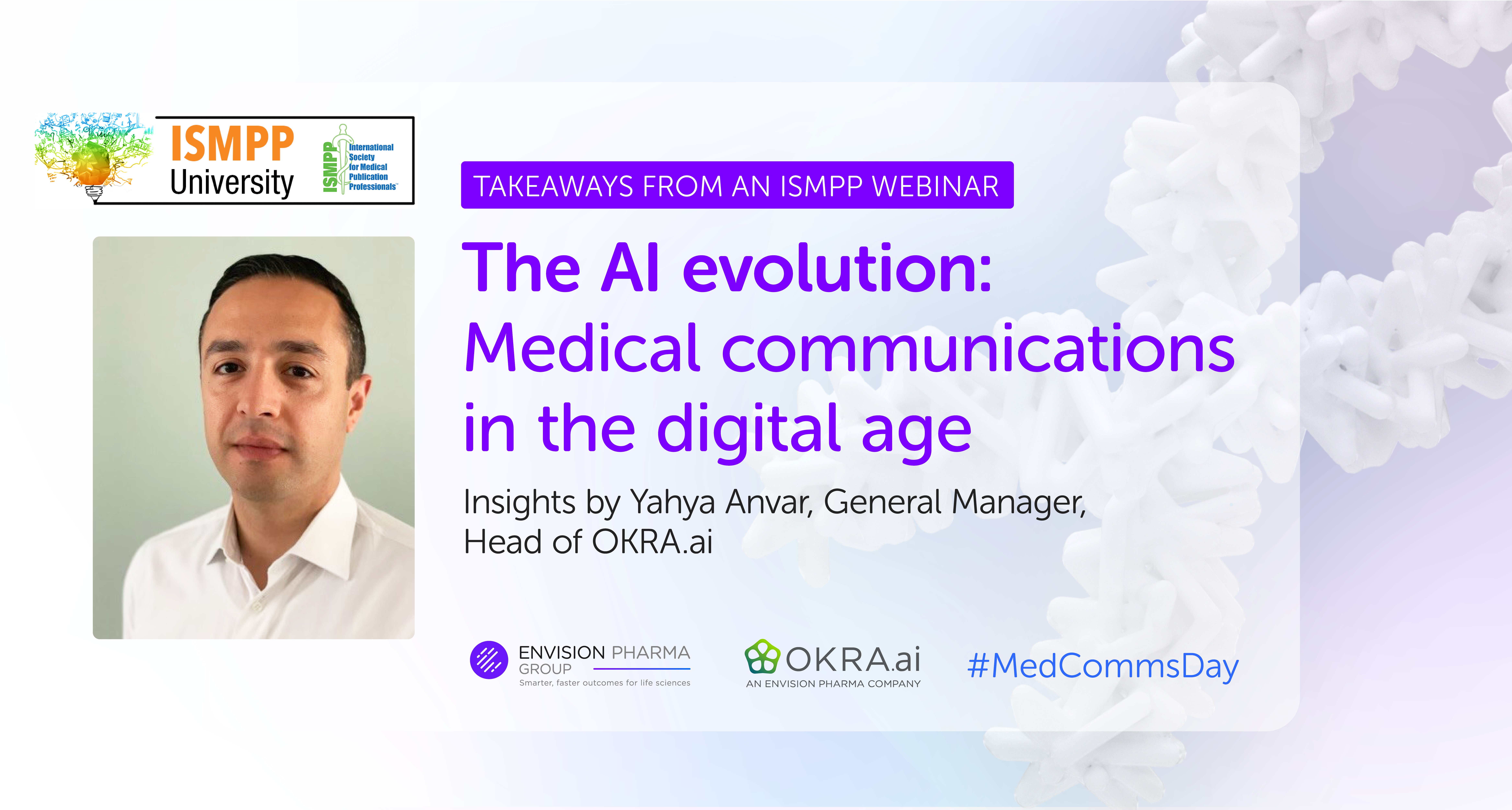
In recognition of “MedComms Day” in June, ISMPP hosted a thought-provoking 90-minute webinar titled "The AI evolution: Medical communications in the digital age," featuring Dr. Yahya Anvar, General Manager of OKRA.ai, and other distinguished speakers including:
- Hélène Dassule, Head of Strategy and Excellence GHEOR, GMC, Training/Field Capabilities, Alexion Pharmaceuticals
- Simon Foulcer, Director, BPM Evidence Publications, AstraZeneca
- Matt Lewis, Global Chief Artificial and Augmented Intelligence Officer, Inizio Medical
This insightful session delved into the transformative impact of generative AI on scientific communication within the pharmaceutical industry. The summary below captures Yayha’s insights, from his perspective as a scientist and innovator.
Dr. Yahya Anvar’s insights from an ISMPP webinar
Embracing AI technologies not only promises to revolutionize engagement through more accessible and timely dissemination of complex data, but also signifies a paradigm shift in medical communications.
Yahya’s insights aimed to facilitate a comprehensive dialogue on the benefits, limitations, and ethical implications of deploying generative AI in medical communications. Drawing on his extensive AI expertise and leadership in developing AI platforms for plain language summaries (PLS), Yahya shared real-world experiences, strategies, and best practices.
- Transformative potential of technology in healthcare
- AI and technology have significant potential to transform healthcare by managing the increasing flow of information and aiding timely decision-making
- AI and technology have significant potential to transform healthcare by managing the increasing flow of information and aiding timely decision-making
- Challenges with information overload
- Healthcare professionals face an overwhelming amount of information from various channels, a problem that will only intensify over time
- Technology can help overcome these challenges by automating processes and analyzing vast amounts of data
- Bias and fairness in AI
- It is crucial to recognize and mitigate biases in AI models. Examples include changes in image descriptions and occupational depictions based on race and gender, which highlight inherent biases in training data
- AI must provide fair representation across different demographics, especially in sensitive areas like healthcare
- Complexity of AI deployment
- Deploying AI in healthcare is complex, involving ethical considerations, trust, upskilling users, and change management
- Cross-functional and multidisciplinary teams are essential for successful AI implementation
- Ethical guidelines for AI
- Ethical AI deployment must consider human autonomy, prevention of harm, fairness, transparency, and accountability
- Examples illustrate how biases can emerge in AI outputs, stressing the need for robust ethical guidelines
- Importance of explainable AI
- Explainable AI is vital for understanding AI decisions, building trust, and identifying biases
- Transparency in AI processes enables users to understand and trust the outcomes
- Responsible AI implementation
- Selecting appropriate use cases, upskilling target audiences, establishing standards, and ensuring data quality are critical for responsible AI implementation
- Trust-building is essential to driving AI adoption in healthcare
- Focus of advanced AI organizations
- Advanced organizations focus on technical implementation and talent acquisition, but often neglect ethical and governance aspects
- A balanced approach is necessary to ensure responsible AI deployment
- Integrated solutions for continuous improvement
- Combining specialized AI platforms, subject matter expertise, and refined processes creates a feedback loop that enhances the system over time
Yahya’s insights underscore the importance of ethical considerations, bias mitigation, and the complexity of deploying AI in healthcare, emphasizing the need for a holistic approach to integrating technology into the industry. Implementing AI responsibly requires a multi-faceted approach that prioritizes ethical considerations, transparency, accountability, and patient-centered care.